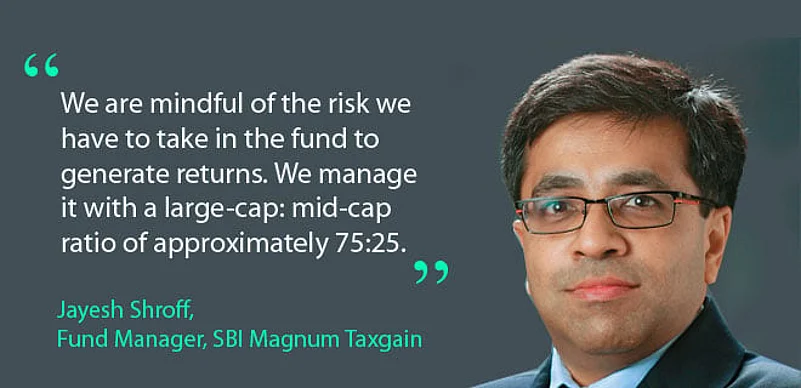In an interview with Outlook Money, Jayesh Shroff, fund manager, SBI Magnum Taxgain, shares his views on the ELSS, and more. Excerpts:
The fund seems to be a bit subdued with its performance. What has impacted its performance?
I do not agree with the perception of subdued performance of the fund. If you look at the fund’s 1-year, 3-year and 5-year performances, it has outperformed the benchmark by 16.86 per cent, 6.83 per cent and 3.77 per cent, respectively. This reflects an excellent performance track record.
Second, ELSS is a very generic category where there are all types of funds with asset allocation varying from predominantly large-caps to predominantly mid- and small-caps.
As one would not compare a large-cap fund with a mid-cap fund, similarly comparing all mutual funds in ELSS category purely based on their returns is not the right way to compare ELSS funds.
Has the fund’s philosophy changed over the past two decades?
The fund has been in existence for over two decades and its philosophy has evolved with the changing market structure. Over the last 5-7 years, we have followed a consistent philosophy for managing the fund. We strive to generate superior risk-adjusted returns for investors with the objective to consistently outperform the benchmark. As ELSS is largely a retail product, we are mindful of the risk that we take in the fund to generate returns. We manage the fund with a large-cap: mid-cap ratio of approximately 75:25.
What are the challenges when managing an ELSS fund in terms of investor expectations?
As mentioned earlier, the biggest challenge is to make people understand that ELSS is not a homogenous category and, therefore, one should not be comparing the funds purely on the basis of their returns. One has to see long-term track record of the fund and choose accordingly.
How does a stock make its way into this fund? What kind of stocks and sectors do you avoid?
In this fund, we invest in stocks on the basis of their potential for generating long-term returns. We usually avoid buying stocks with trading view. Second, we buy into stocks or sectors where we see meaningful incremental change happening either in the business, management, or, competitive environment. This is because we feel that wherever there is a large change in business dynamics, there is potential to generate large returns over a long period of time. We have usually avoided buying global commodity stocks, as they are short-term cyclical plays, which we avoid.
What will be your advice to investors in this fund?
As mentioned above, ELSS is a retail product and, therefore, one should look at long-term performance of the fund. As a fund house we believe that generating consistent returns is more important than just generating higher returns, because consistent long-term return is always better than volatile short-term returns.
The story first appeared in Outlook Money in March 2015 print edition













